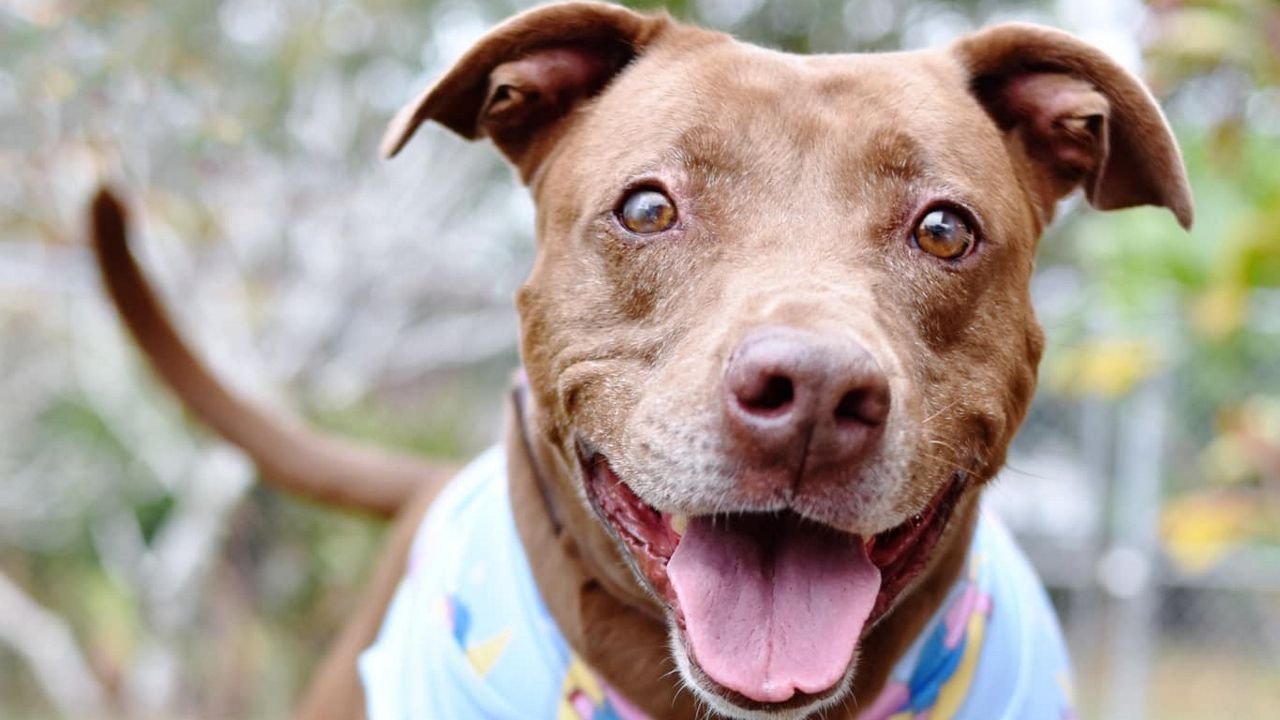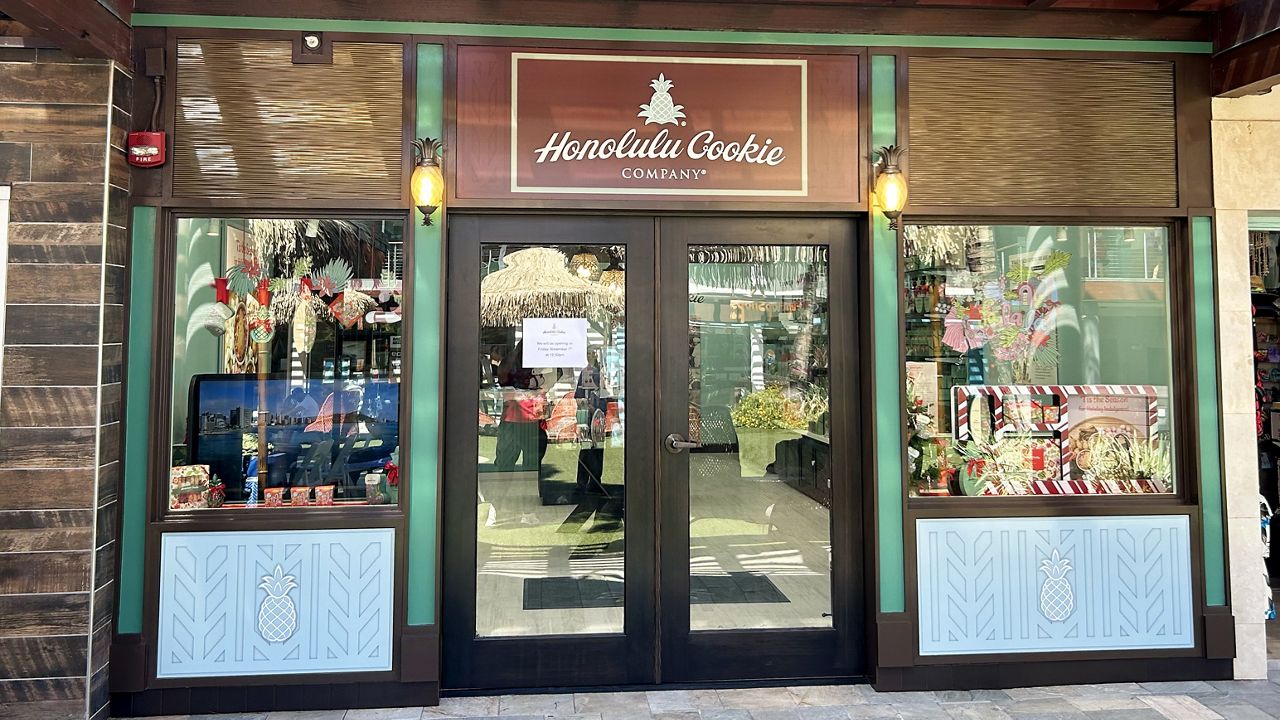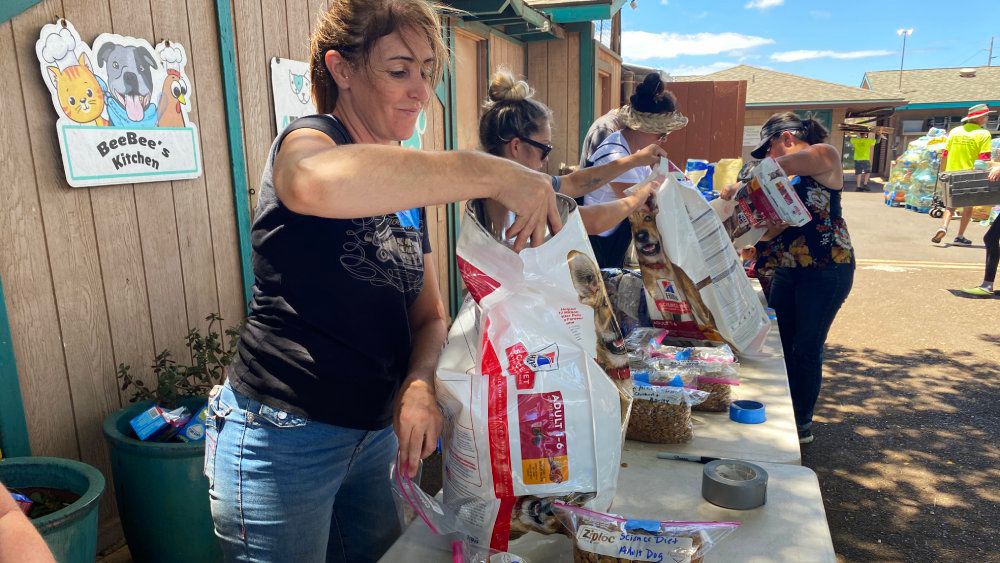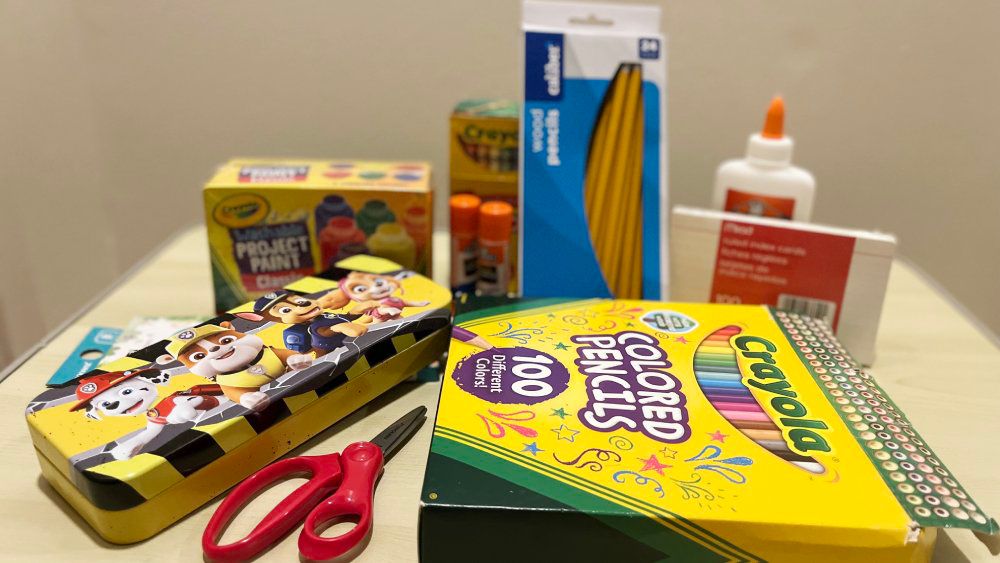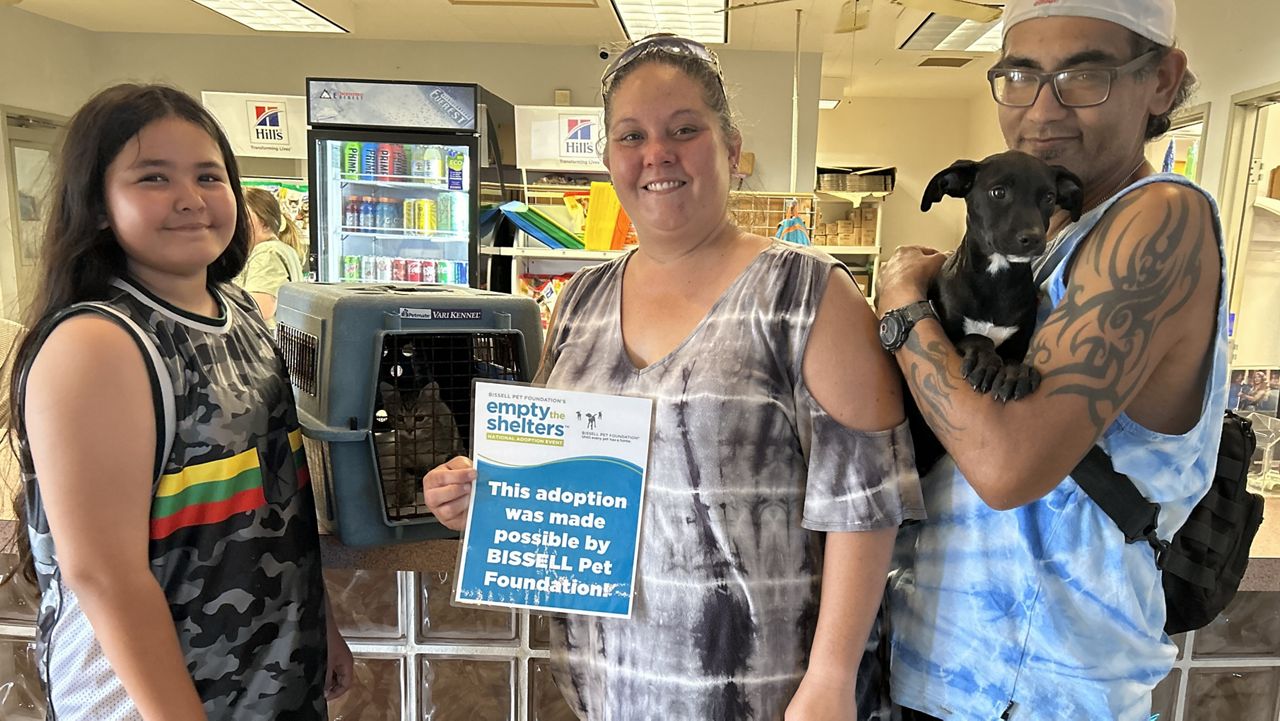Animal shelters on Oahu, Kauai, Maui and Hawaii Island all said they are at max capacity and are asking people to foster or adopt dogs.
With many dogs recently brought into animal shelters as strays or surrendered by their owners, the Hawaiian Humane Society on Oahu, Ohana Paw Rescues on Oahu, the Maui Humane Society, Kauai Humane Society and Hawaii Island Humane Society in Keaau and Kona are all saying they are at max capacity.
Maui Humane Society said in a release that they currently have 105 dogs in their care, but only kennel capacity for 40 dogs. Because the shelter is over capacity, they are putting two dogs in each kennel, but that still does not provide enough space for all the dogs.
Brandy Shimabukro, a spokesperson for the Hawaiian Humane Society, told Spectrum News Hawaii that they currently have 80 adoptable dogs, which doesn’t include the many dogs being fostered or awaiting medical care.
The Hawaii Island Humane Society and Ohana Rescue Paws, an animal rescue on Oahu, only take in animals that they have the resources for, since their respective counties don’t contract them to provide animal control services like the other shelters mentioned. This means they are never over capacity, but representatives for both said they are still seeing an influx of dogs.
An influx of dogs is affecting Hawaii and mainland shelters
Tami Schatz, who runs Ohana Rescue Paws, told Spectrum News Hawaii that it is hard to find adopters and “extremely hard” to find fosters right now because many people do not have the time or resources.
She also said many people adopted dogs in 2020 during the pandemic because they wanted a quarantine buddy, so there are fewer people now looking to adopt.
However, this problem isn’t unique to Hawaii — shelters across the United States are over capacity. According to a report for Shelter Animals Count, a national database, 4% more animals entered shelters than left them in 2022.
“The nation has been seeing animals, especially dogs, residing in shelters longer,” the Kauai Humane Society’s Executive Director Nicole Schafer Crane said in the news release in December. “The Kauai Humane Society is also seeing longer lengths of stay as adoptions are less than last year and our shelter partners on the continent are remaining full, so they are unable to take in our animals and help them find homes outside of Kauai.”
Lauren Nickerson, who is the Chief Executive Officer for the Hawaii Island Humane Society, told Spectrum News Hawaii that they have also experienced reduced adoption rates, which has coincided with an influx of dogs being surrendered.
Like the Kauai Humane Society, she said in past years, the Hawaii Island Humane Society worked with mainland shelters in communities that “have a higher concentration of adopters and lower concentrations of homeless animals.”
“When I first started in 2018, it was not uncommon for us to send five or ten dogs to the mainland every week,” said Nickerson.
However, the mainland shelters are facing the same overcrowding issues as Hawaii shelters and are no longer accepting out-of-state animals.
A lack of pet-friendly housing and an increase in financial hardship
Katie Shannon, a spokesperson for the Maui Humane Society, told Spectrum News Hawaii that a lack of pet-friendly housing and the state’s high cost of living are fueling the problem.
“Many people need to downsize their current living situation and therefore are moving to places that are not pet friendly,” Shannon said in an email. “Pet friendly housing is insanely expensive on Maui and there are barely any pet friendly accommodations for rent. Additionally, when people move to the mainland, they often surrender their pets, not realizing we can help them take their pet with them.”
Shimabukro, with the Hawaiian Humane Society, agreed that for many pet owners on Oahu, a lack of affordable, pet-friendly housing exacerbates the problem.
Shimabukro said Senate Bill 1241, which prohibits the Hawaii Public Housing Authority from banning pets from state-funded public housing, would allow animals to stay with the people who already love them.
Nickerson said she has seen the same housing and financial issues on Hawaii Island and agreed the state should pass SB 1241.
While some landlords look at pets as a nuisance, Nickerson said that is an outdated idea.
“[Landlords] see animals as causing damage, being a nuisance, and they see all the problems with it. We want to work with landlords to see the benefit of it. There's a lot of research that shows that pet owners can be really responsible tenants — they want to do everything they can to keep their lease, so that they can keep their pet,” said Nickerson.
In order to help people facing financial hardship, the Hawaii Island Humane Society runs a pet pantry program every Friday, where they give about 300 people food to feed their pets. She described it as heartbreaking to see people struggling to choose between feeding themselves or their pets, who they love and don’t want to give up.
“Backyard breeders” no longer able to find homes for purebred puppies
Nickerson said people who are breeding animals for profits (“backyard breeders”) are surrendering litters of puppies, because so many people already adopted dogs during the pandemic, so there is less of a market for these purebred dogs.
“I don’t think that they’re as successful as they used to be,” said Nickerson. “As those puppies are growing and they’re not making money for them, they’re now costing money. We’re certainly seeing a lot more litters of puppies come through our doors than I recall in my past four years that I’ve been with the organization.”
Schatz, with Ohana Rescue Paws, said the state should pass a law that would require breeders to have a license, because they are doing it to make money, “not for the betterment of the animal.”
“You could be fined, if you get caught trying to sell a litter and you don't have a license for it,” said Schatz.
How to help: Foster, adopt and donate
The Hawaiian Humane Society encourages both short-term and long-term fostering of animals. Their “Couch Crashers” program allows people to foster an animal for as little as 72 hours. The Hawaiian Humane Society also provides foster parents with supplies to care for the animals.
According to the Hawaiian Humane Society, short-term foster programs like Couch Crashers benefit dogs by helping to reduce the stress and increased cortisol levels common in a shelter environment.
For those interested in adopting, the Hawaiian Humane Society is lowering adoption fees to just $14 for all animals until Feb. 19. Usually, costs range from $25 to $250. Check out the Hawaiian Humane Society’s adoptable animals and donate.
The Maui Humane Society also runs a short-term foster program called “SOS Foster” that provides all necessary supplies. This program allows Maui visitors staying in dog-friendly accommodations, part-time residents or anyone looking for a no-commitment pet to foster.
For adoptions, the Maui Humane Society has a 10-day adoption trial program called “Paws-to-Adopt.” The Maui Humane Society is extending its hours until 7 p.m. on Feb. 17 to allow prospective pet owners a chance to visit the animals. Adoptions are currently free. Check out the Maui Humane Society’s adoptable animals.
The Kauai Humane Society encourages people to adopt or foster animals. KHS supplies food, medical care and supplies to foster volunteers. Check out the Kauai Humane Society’s adoptable dogs and donate. Also, check out KHS’s Amazon wishlist.
The Hawaii Island Humane Society asks people to foster and adopt. Nickerson encouraged people to consider a rescue dog, describing them as loving and lovable animals. She also said fostering allows the shelter to help for more animals while they look for forever homes for them.
When someone fosters or adopts a pet, the Hawaii Island Humane Society makes sure the animal has received medical care from vaccines to microchips and the animal goes home “completely dressed” with a harness, collar and leash.
“We have two full shelters of social, friendly dogs that just want to be someone's best friend,” said Nickerson. “When you do get an animal from the shelter, you are going to get a lot of support that goes with it because we want to set people up for success.”
Nickerson, with the Hawaii Island Humane Society, said donations are also helpful, whether monetary donations or supplies for the pet pantry program.
“We are running very low right now. We accept donations of unused, unopened bags of dog food and cat food,” said Nickerson.
The Hawaiian Island Humane Society also has an Amazon wishlist, where people can purchase items that are sent directly to the shelter.
Schatz, who runs Ohana Rescue Paws on Oahu, said her rescue group does not shelter animals, and instead relies solely on fosters while she looks for forever homes for animals. Along with helping by fostering animals, Schatz said donations of pet supplies, such as food and pee pads, help because she can give them to people fostering animals.
View Ohana Rescue Paws’s adoptable animals on their Facebook group and donate through their Amazon wishlist.
Michelle Broder Van Dyke covers the Hawaiian Islands for Spectrum News Hawaii. Email her ideas and feedback at michelle.brodervandyke@charter.com.



